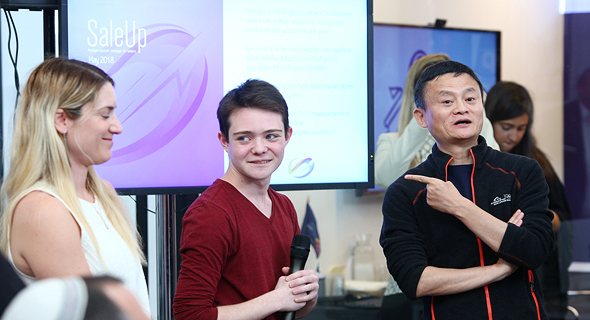Chinese Investments in Israeli Tech Mapped
A proven hotbed of new technologies, for Chinese investors the small Israeli market represents an opportunity to acquire knowledge, and study innovation
In Early January, U.S. National Security Adviser John Bolton visited Israel to discuss defense and regional issues. According to Israel’s national broadcaster Kan, between discussions on Syria and Iran, he raised one other pressing American concern: the involvement of Chinese companies in Israel's economy, and in its tech industry, via invested capital.
For daily updates, subscribe to our newsletter by clicking here.
In the past decade, Chinese investors have discovered Israeli industry and technology. More and more Chinese money has been finding its way to Israel's shores, more Chinese construction companies have set foot in the local market, and incoming tourism from China blossomed. One China-based company has won a project to build and operate Israel's Haifa seaport, where American navy vessels regularly dock, for 25 years.
 Alibaba founder and CEO Jack Ma meeting Israeli entrepreneurs. Photo: Dror Sithakol
Alibaba founder and CEO Jack Ma meeting Israeli entrepreneurs. Photo: Dror Sithakol
A proven hotbed of new technologies, for Chinese investors the small Israeli market represents an opportunity to acquire knowledge, and study innovation. It is also a more forthcoming market, when it comes to being on the receiving end of Chinese funds, than the U.S. market and some parts of Europe.
In July, CTech reported the soaring trade relations between Israel and China started drawing criticism in the U.S. On Sunday, an op-ed published by The Wall Street Journal warned of Chinese “ influence over as much as 25% of Israel’s tech industry.” Authored by Ilan Berman, a senior vice president at the American Foreign Policy Council, a Washington-based conservative non-profit think tank, the article published does not include a reference for the figure mentioned.
According to the interviews held by Calcalist, China-based limited partners of local venture funds committed at times hundreds of millions of dollars from a single entity. Through the local funds, corporations like Alibaba and Baidu, Chinese government entities, and some of China’s wealthiest businesspersons have gained access to Israeli startups.
Alongside funds committed to Israeli venture funds, Chinese entities have also stepped up their game in terms of direct investments in local startups. According to a November report by IVC, over the past two years the average qarterly number of direct Chinese investments in Israeli companies grew from 15 to 20.
Total sums invested also grew. Over the past five years, according to the report by IVC, around $1.5 billion of Chinese dollars were invested in around 300 Israeli companies. Investors included Li Ka-Shing's Hong Kong-headquartered Horizons Ventures and Alibaba's investment arm.
Israeli companies need to consider the possible ramifications of being backed by China-based entities, especially if operating in domains that may have national security implications, including cybersecurity, energy, and mobility, former U.S. ambassador to Israel Daniel Shapiro said in an interview with Calcalist Tuesday. Companies operating in such domains may find their ability to do business with certain American partners, especially government entities diminished if they have Chinese backers, he said.
"An Israeli startup in its seed or A round may not be thinking so many years ahead about its market strategy in the U.S., but if it has a significant Chinese investor component, even in its early rounds, several years later, when it’s ready to take its technology deep into the U.S. market, it may find that there are some real repercussions," Shapiro said.
 Former U.S. Ambassador to Israel Dan Shapiro. Photo: Amit Sha'al
Former U.S. Ambassador to Israel Dan Shapiro. Photo: Amit Sha'al
Israeli venture capitalists are starting to feel the pressure. Access to Chinese money used to be a source of bragging rights in the local industry, but now many executives prefer to be silent about their Chinese partners. "All we can do is to keep quiet," a local industry executive told Calcalist speaking on condition of anonymity. The China-based giant his company partnered with is helping it grow, he said.
To map Chinese tech investments in Israeli tech firms Calcalist interviewed over a dozen venture capital executives, and reviewed data collected by Israel-based market research firm IVC Research Center Ltd. and Tel Aviv-based non-profit organization Start-Up Nation Central (SNC).
The result: a list of Chinese limited partners of local venture funds, which have proven to be a central channel for Israel-bound capital coming from China. Entries include a list of Chinese limited partners, the identity of the local venture fund, some of its partners, and some of its portfolio companies.
Direct investments in Israel-based companies made by China-based investors are not included in the following list.
Israeli venture capital firm: Pitango Venture Capital
China-based limited partner: China’s sovereign wealth fund, China Investment Corporation (CIC)
Funds committed: Around $50 million
Leading partners at the Israeli fund: Nechemia (Chemi) J. Peres, Rami Kalish, Isaac Hillel, Eyal Niv, Aaron Mankovski
Some portfolio companies of the Israeli fund: Content discovery company Taboola.com Ltd., marketing analytics company AppsFlyer Ltd. digital health startup Medisafe Project Ltd.
Israeli venture capital firm: Jerusalem Venture Partners (JVP)
China-based limited partner: Alibaba Group Holding Ltd.
Funds committed: Tens of millions of dollars
Leading partners at the Israeli fund: Erel Margalit
Some portfolio companies of the Israeli fund: Cybersecurity startup Morphisec Ltd. cybersecurity company Vicarius Ltd. Israeli baby sleep monitors startup Nanit Udisense Inc., big data management startup Iguazio Systems Ltd.
Israeli venture capital firm: Canaan Partners Israel
China-based limited partner: Lenovo Group Ltd.
Funds committed: Several million dollars
Leading partners at the Israeli fund: Izhar Shay, Ehud Levy
Some portfolio companies of the Israeli fund: City management company Zencity Technologies Ltd., high-resolution auto radar startup Arbe Robotics, cybersecurity startup Regulus Cyber Ltd.
Israeli venture capital firm: Viola Ventures
China-based limited partners: Baidu, Inc., Ping An Insurance Group Co of China Ltd., Qihoo 360 Technology Co. Ltd.
Funds committed: Tens of millions of dollars
Leading partners at the Israeli fund: Shlomo Dovrat, Avi Zeevi, Daniel Cohen, Ronen Nir
Some portfolio companies of the Israeli fund: Interactive content startup Playbuzz Ltd., home tech support company Puls Technologies Inc., autonomous vehicle technology developer VayaVision Sensing Ltd., agricultural intelligence company Taranis-Visual Ltd.
Israeli venture capital firm: Catalyst Private Equity Partners Fund L.P.
China-based limited partner: China Everbright Ltd. (CEL)
Funds committed: $200 million
Leading partners at the Israeli fund: Yair Shamir and Edouard Cukierman
Some portfolio companies of the Israeli fund: Content discovery company Taboola.com Ltd, milling and drilling solutions company Lamina Technologies S.A. metal and ceramic 3D-printing startup XJet Ltd.
Israeli venture capital firm: Emerge
China-based limited partners: State-owned China Merchants Group Fund, Alibaba co-founder Yongming Wu, ZhenFund founder Xu Xiaoping (Bob Xu), Zhang Ying (David Zhang), founding managing partner of Matrix Partners China Zhang Ying (David Zhang)
Funds committed: $30 million
Leading partners at the Israeli fund: Dovi Ollech, Avi Hasson
Some portfolio companies of the Israeli fund: Autotech company Cognata Ltd.,
artificial intelligence medical imaging company Aidoc Medical Ltd., computer vision technology startup VisionCortex Ltd. known as Percepto.
Israeli venture capital firm: Magma Venture Partners
Limited partners: An undisclosed Hong Kong-based company
Funds committed: Tens of millions of dollars
Israeli firm: Magma Venture Partners
Leading partners at the Israeli fund: Modi Rosen, Yahal Zilka
Some portfolio companies of the Israeli fund: Automotive communication chips startup AutoTalks Ltd., rental property management company Guesty, Inc., mobile gaming company TabTale Ltd., industrial security software startup Indegy Ltd.



